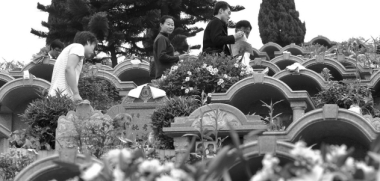 Tombs sold at up to 50,000 yuan per square meter Chinese ‘can’t afford to die’ as funeral costs soar IT is the Qingming Festival again. And as usual, the topic of the funeral industry has once again arisen. Tomb sweepers to the Bao’an Fudi Cemetery in Xili on Sunday found the prices of tombs had risen by 10 to 20 percent to 30,000-40,000 yuan (US$4,545-6,060) per square meter. The tomb of the best location in the cemetery was priced at 208,000 yuan for four square meters, or 50,000 yuan per square meter, equivalent to prices of luxury homes in prime locations. Last year the tombs were sold at 180,000 yuan. At the cemetery, the prices of tombs vary according to location. Take the Yong’an Cemetery inside the Bao’an Fudi as an example, the first nine rows of the tombs were the cheapest ones and priced at 133,000 yuan for four square meters, while the best ones between the rows of 27-29 were priced at 50,000 yuan per square meter. The prices of the so called “affordable tombs,” 3.6 square meters in size, have also increased by more than 10 percent to between 49,000 and 69,000 yuan. Manager Chang of the Xili cemetery said tomb prices were rising as inflation pushed up raw material costs, construction fees, and the cost of transport and labor. At the Overseas Chinese Cemetery in Dapeng, a tomb is generally sold at HK$200,000 (US$25,740) and there were very few left. In China, the funeral industry is monopolized with an excuse to provide the poor with necessary or fundamental service. The fact is quite the opposite and many people sigh that they “can’t even afford to die.” In life, you’re a house slave. In death, you’re a tomb slave, one netizen lamented. In Beijing and Shanghai, a proper send-off can cost between 10,000 and 20,000 yuan, Xinhua news agency said. Funerals for family members cost the average Beijing resident three months’ salary. “Funeral costs have surged from hundreds of yuan in the 1980s to tens of thousands of yuan. I’m afraid I cannot afford my own death,” the report quoted 89-year-old Li Chengxian as saying. For decades after the founding of New China, China forbade burials in order to conserve badly needed land and insisted instead on cremations. Earlier last week China announced it was to outlaw the trade in tomb — speculating on the business of selling graves — after it bankrupted many investors, as the government steps up regulations on a lucrative but poorly regulated industry. Funeral providers rarely charge for services but make money by marking up the cost of products, sometimes as much as 20 times the original price, and mourning relatives are loath to bargain, Xinhua said. In some areas the cost of a grave per square meter can be twice as much as an apartment. An official at the Civil Affairs Ministry criticized the practice of some cemetery owners of setting up special graveyards that offer “oversized and luxurious graves,” Xinhua said in a separate report. “It’s a severe violation of China’s funeral regulations and a waste of land resources,” it quoted the official as saying. In a Xinhua report Sunday, Zhu Yong, deputy director of the China National Committee on Aging and chief editor of the annual Report on Funerals, also blamed the high cremation and funeral cost to illegal funeral agencies, who would collaborate with mortuaries to ensure more bodies are sent to them and charge high prices to families. (Han Ximin) | 
